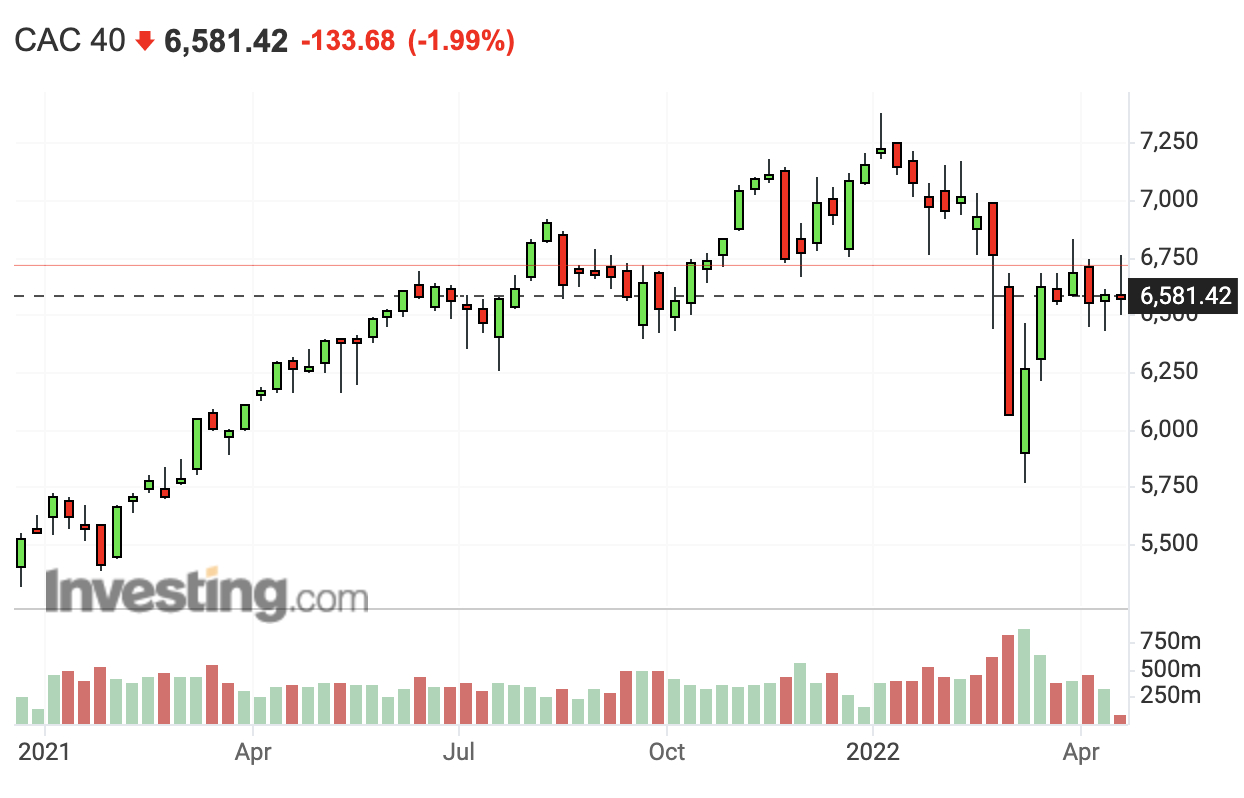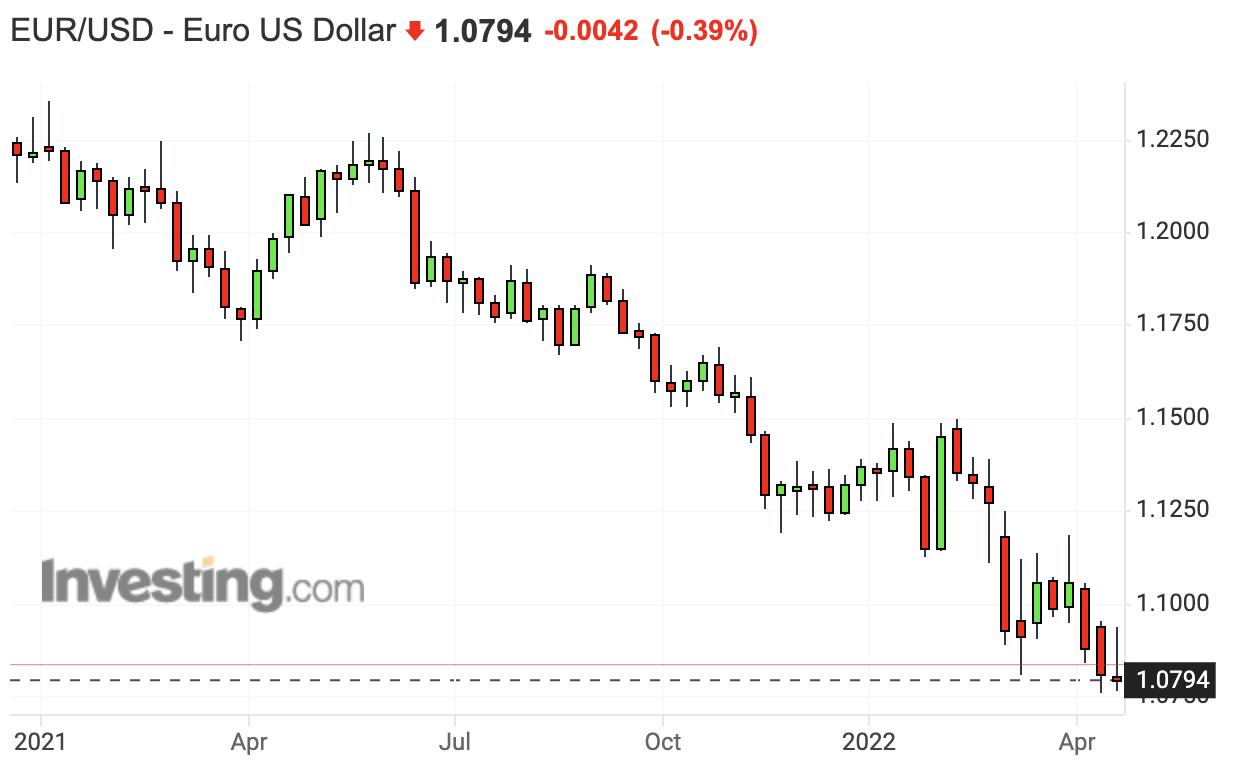French Election: A Future Within The Margin Of Error…
Pantelis Vagionas | Apr 23, 2022 08:06AM ET
Today, Apr. 24, incumbent Emmanuel Macron squares off against far-right rival Marine Le Pen, in what is expected to be a very tight second round for the French presidential race.
The first election round concluded with Macron winning c.27% of overall votes, and Le Pen a close second with c.24%. Third place was taken by far-left candidate Melenchon (c. 21%) who is now seen as a kingmaker, and has denounced Le Pen, but also refused to support Macron, leaving the door open for the undecided to swing the election—much like during the Brexit vote and Trump’s election.
Despite a 3pp lead, the pro-business incumbent faces serious headwinds as voters of eliminated candidates lean towards Le Pen’s protectionist economic policies, her brand of anti-immigration, and Eurosceptic nationalism.
Adding to Macron’s re-election headwinds, is the fact that no sitting French president has been re-elected in the last two decades. Market participants reacted to the uncertainty by tempering their expectations in the near-term.
However, for the longer term, its either business as usual under Macron, or a major shakeup under Le Pen, and despite it being a close race to call, it is our view that Macron will ultimately prevail.
He is seen as a steady hand during uncertain times, politically strengthened by Russia’s invasion of Ukraine—a dark spot in Le Pen’s political past, having compared herself to Putin multiple times.
With regards to financial markets, it’s clear that Le Pen’s presidency would disrupt domestic equity and bond markets. On par with the Brexit shock, a surprise win is expected to reverberate across European markets, further pressuring EUR/USD even as low as 1.03 according to Citi analysts.
As the head of research at Axios Alternative Investments noted:
“there are expectations for a harmonized European response to try and blunt the economic shock…and there’s a fear that with Le Pen you wouldn’t have the same level of co-ordination,” adding that “you wouldn’t necessarily have that macro buffer that’s important for banks’ profitability.”
As far as campaign promises go, Le Pen’s plans are expected to hurt several industries including, but not limited to, banking, insurance, transportation, construction, and food retail.


The banking industry is expected to suffer should Macron fail to be re-elected, driven by a forecasted widening of the spread between the yield on French/German government bonds, which would be ‘a clear negative’ for French asset managers and insurance companies.
The effects on construction/transportation companies are diverse, both candidates support a significant increase in nuclear investments, and broader energy transition and infrastructure spending—benefiting industrials, according to UBS.
Nevertheless, Le Pen’s promise to nationalize highways, would negatively impact valuations of major industrial firms operating toll-road concessions, i.e., Vinci (OTC:VCISY), Eiffage (OTC:EFGSY), and Bouygues (OTC:BOUYY).
The domestic food retail industry, already bruised by inflationary pressures, has the largest upside should Macron secure a second term in office.
Companies directly linked to the food retail business, i.e., Accor SA (OTC:ACCYY), Elior Group (EPA:ELIOR), and Sodexo (OTC:SDXAY) are expected to struggle meeting the requirement, promised by Le Pen, that at least c.80% of food products in cafeterias should come from France.
Additionally, her rigid immigration control could hurt industries already facing labor shortages—including hospitality and construction.
Overall, the uncertainty around the election and the nature of the potential outcomes were major headwinds for French—and less so for European—equities as of late.
Apr. 24 should offer a welcome respite to investors, as it provides some clarity over the longer-term outlook.
Trading in financial instruments and/or cryptocurrencies involves high risks including the risk of losing some, or all, of your investment amount, and may not be suitable for all investors. Prices of cryptocurrencies are extremely volatile and may be affected by external factors such as financial, regulatory or political events. Trading on margin increases the financial risks.
Before deciding to trade in financial instrument or cryptocurrencies you should be fully informed of the risks and costs associated with trading the financial markets, carefully consider your investment objectives, level of experience, and risk appetite, and seek professional advice where needed.
Fusion Media would like to remind you that the data contained in this website is not necessarily real-time nor accurate. The data and prices on the website are not necessarily provided by any market or exchange, but may be provided by market makers, and so prices may not be accurate and may differ from the actual price at any given market, meaning prices are indicative and not appropriate for trading purposes. Fusion Media and any provider of the data contained in this website will not accept liability for any loss or damage as a result of your trading, or your reliance on the information contained within this website.
It is prohibited to use, store, reproduce, display, modify, transmit or distribute the data contained in this website without the explicit prior written permission of Fusion Media and/or the data provider. All intellectual property rights are reserved by the providers and/or the exchange providing the data contained in this website.
Fusion Media may be compensated by the advertisers that appear on the website, based on your interaction with the advertisements or advertisers.